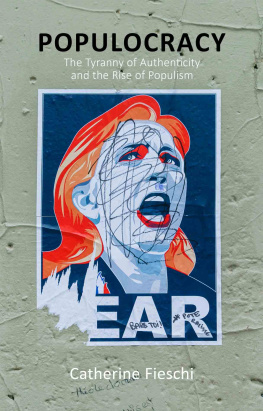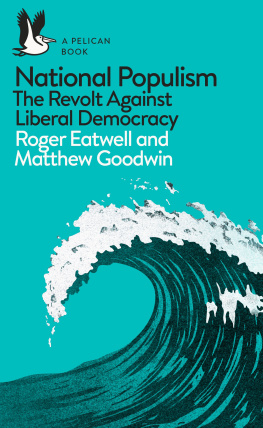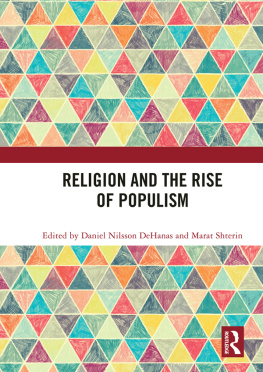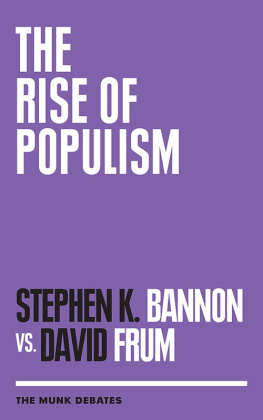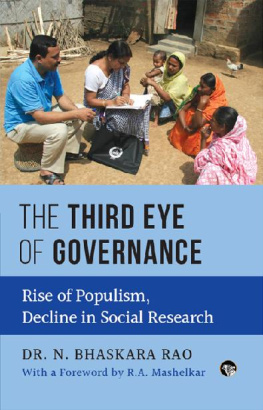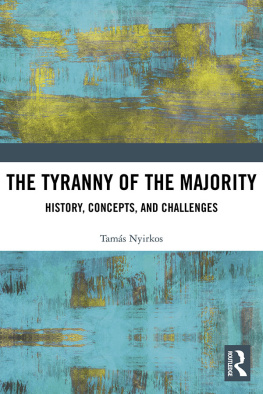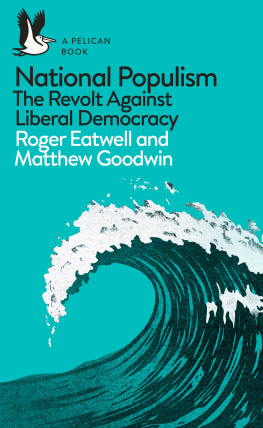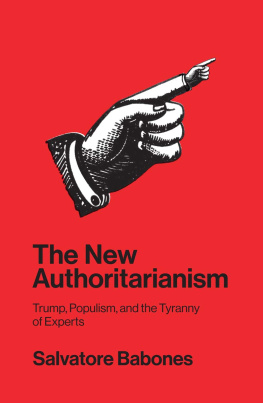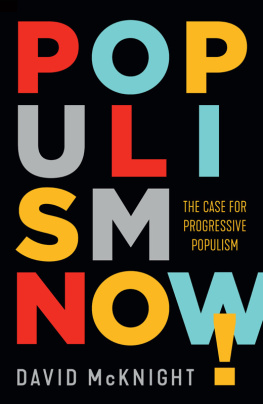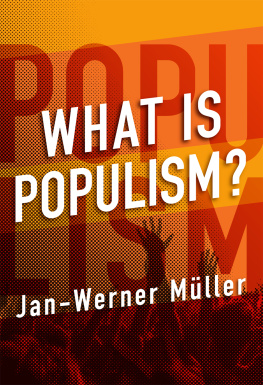Fieschi - Populocracy : the tyranny of authenticity and the rise of populism
Here you can read online Fieschi - Populocracy : the tyranny of authenticity and the rise of populism full text of the book (entire story) in english for free. Download pdf and epub, get meaning, cover and reviews about this ebook. year: 2019, genre: Politics. Description of the work, (preface) as well as reviews are available. Best literature library LitArk.com created for fans of good reading and offers a wide selection of genres:
Romance novel
Science fiction
Adventure
Detective
Science
History
Home and family
Prose
Art
Politics
Computer
Non-fiction
Religion
Business
Children
Humor
Choose a favorite category and find really read worthwhile books. Enjoy immersion in the world of imagination, feel the emotions of the characters or learn something new for yourself, make an fascinating discovery.
Populocracy : the tyranny of authenticity and the rise of populism: summary, description and annotation
We offer to read an annotation, description, summary or preface (depends on what the author of the book "Populocracy : the tyranny of authenticity and the rise of populism" wrote himself). If you haven't found the necessary information about the book — write in the comments, we will try to find it.
Fieschi: author's other books
Who wrote Populocracy : the tyranny of authenticity and the rise of populism? Find out the surname, the name of the author of the book and a list of all author's works by series.
Populocracy : the tyranny of authenticity and the rise of populism — read online for free the complete book (whole text) full work
Below is the text of the book, divided by pages. System saving the place of the last page read, allows you to conveniently read the book "Populocracy : the tyranny of authenticity and the rise of populism" online for free, without having to search again every time where you left off. Put a bookmark, and you can go to the page where you finished reading at any time.
Font size:
Interval:
Bookmark:
Comparative Political Economy
Series Editor: Erik Jones
A major new series exploring contemporary issues in comparative political economy. Pluralistic in approach, the books offer original, theoretically informed analyses of the interaction between politics and economics, and explore the implications for policy at the regional, national and supranational level.
Published
Europe and Northern Irelands Future
Mary C. Murphy
The New Politics of Trade
Alasdair R. Young
Populocracy
Catherine Fieschi

Catherine Fieschi 2019
This book is copyright under the Berne Convention.
No reproduction without permission.
All rights reserved.
First published in 2019 by Agenda Publishing
Agenda Publishing Limited
The Core
Bath Lane
Newcastle Helix
Newcastle upon Tyne
NE4 5TF
www.agendapub.com
ISBN 978-1-78821-024-9 (hardcover)
ISBN 978-1-78821-025-6 (paperback)
British Library Cataloguing-in-Publication Data
A catalogue record for this book is available from the British Library
Typeset by JS Typesetting Ltd, Porthcawl, Mid Glamorgan
Printed and bound in the UK by TJ International
Contents
Wanting to be understood, as adults, can be, among many other things, our most violent form of nostalgia.
Adam Phillips, Missing Out
In writing this book I have drawn on the generosity and knowledge of a number of people who should not go unmentioned. Chief amongst them: Erik Jones as friend, editor and enthusiastic sounding board; Heather Grabbe who has been a constant and thoughtful interlocutor on these issues, and Michael Freeden whose work and insights have shaped much of the thinking behind this volume. Joel Gombins meticulous work on the French far right and French populism has been immeasurably valuable, as has his willingness to respond to my many untimely WhatsApp queries; Finally, I have tried to heed Simon Kupers exhortations and advice to tell a story as best I could.
My colleagues at Counterpoint Marley Morris, Lila Caballero-Sosa and Ulrike Grassinger, have all contributed immensely to my thinking over the past few years, and have been, crucially, wonderful companions in what can only be described at times, as unnerving research settings. Susanna Abse and David Tuckett helped me find my way through the thicket of basic psychoanalytic concepts and asked the kind of left-field questions that move thinking forward and shift perspective. Jamie Bartlett, Serge Bossini, Ian Bremmer, Aristos Doxiadis, Tina Fordham, John Gaffney, Eva Hoffman, Bo Lidegaard, and Sabine Selchow have all also contributed in different ways, through sustained conversations, friendly challenges, or helpful suggestions.
To all of them I am affectionately indebted. You can credit them with the best of this book, and leave all errors and major imperfections at my doorstep.
Its no secret that populism in Europe and elsewhere is something I have been thinking about for too long. As a former academic, in my roles in think tanks and research groups, and in various advisory capacities. It is also probably something on which I spend too much of my leisure time. So, this book is dedicated to Benjamin, Gabriele, Thomas, Jack and Nina, who I hope will spend far less of their lives thinking about populism. But that only depends on us.
Catherine Fieschi
London
The first time I walked into Jean-Marie Le Pens office, it was in Brussels. Having spent months trying to secure a meeting with him in Paris, I realized that it would be a lot easier to set this up at the European Parliament where no one wanted anything to do with him.
Countless letters to the Front Nationals then head of press had created a tenuous connection with her: we had moved from who are you exactly? (a PhD student studying the FN), to in principle, yes (but not now), and finally to a relationship, of sorts, in which I donned the mantel of supplicant on a weekly basis and she magnanimously showed increasing amounts of calendar flexibility. We reached the high-point of our calendar courtship when she finally revealed the name and phone number of the woman who handled le Chefs appointments in Brussels and the specific dates on which I was most likely to clinch an interview.
This was summer 1996. I had a studious, academic, detailed knowledge of Jean-Marie Le Pen and his party. And I had scoured countless interviews, watched him on French television and listened to him on French radio. I had read multiple accounts of populism, in Europe and elsewhere (from the nineteenth-century Russians to the emerging Europeans, via the twentieth-century Latin Americans), examined the geography of votes, the historical lineage, the Poujade references and the links to fascism and authoritarianism. And though all of it was crucial, these strands did not manage to come together to explain the increasing amount of traction that the FN exercised over French politics, the French party system and the French, tout-court.
The one thing I had not done was interact with Le Pen. So, I did not know what to expect but I expected something. I expected something to fall into place that would provide me with the insight that would bring the rest together. It took years before that crucial insight finally came into focus.
At this point it is perhaps worth pointing out that what appeared obvious to me that whatever social science framework my PhD would draw on, it would not stand up to political scrutiny unless it took into account, one way or another, the lived experiences of the person at the centre of the party, of those who worked with him, and of those who listened this was not a view that held much sway in the corridors of North American political science. While case studies were deemed necessary, they were often carried out through remote data gathering, the administering of large questionnaires, and driven by rather abstract models. I did have a model, but it included quite specific humans, in quite specific contexts and circumstances.
Interviewing Le Pen, or his close entourage, as I subsequently did (and his supporters, which I also did), smacked of a kind of interpretive approach rather at odds with the variables-based, hypotheses-constructing, falsification-extracting methodology with which I am at ease, but of which I am not enamoured. Partly, because it is incomplete; and partly because it is not much fun. It is elegant, it generates beautiful models, and it creates an imperative of rigour that I continue to appreciate, indeed, respect and (hopefully) practice. But it leaves politics and the language verbal and symbolic of politics out. It diminishes the role of history and tends to abstract from context. I am hoping that this text brings both of these approaches together: the elegance of the comparative method and the rich fun of political experience.
Bonjour Monsieur Le Pen
Walking into one of the clinical booths that pass for offices in the European Parliament, I was struck by how easy this was. I cannot quite emphasize enough the contrast between the professional, frictionless access I was granted in that moment and the sulphurous coverage that surrounded the man I was about to meet. The latter all the more present in my mind given that this was the culmination of months of planning and, frankly, just making a nuisance of myself.
Yet on this very bright day, there he was, in a three-piece suit sitting behind a bare desk whose pristine order said much about the nature of his presence at the European Parliament. This did not appear to be a place of work: it was a question of being there, marking time and presence rather than doing much else. This was also a time when the FN shared their office with the Belgian far right party, Vlaams Blok (now Vlaams Belang). The area they all occupied felt a little like the naughty corner: it was out of the way, down even more and even more deserted corridors than other party offices. And it felt quiet and empty: a couple of FN posters on the wall, a handful of FN MEPs looking suitably louche in this temple of technocracy and democracy, and a few marooned Vlaams Blok MEPs in bad suits, were all that was visible.
Next pageFont size:
Interval:
Bookmark:
Similar books «Populocracy : the tyranny of authenticity and the rise of populism»
Look at similar books to Populocracy : the tyranny of authenticity and the rise of populism. We have selected literature similar in name and meaning in the hope of providing readers with more options to find new, interesting, not yet read works.
Discussion, reviews of the book Populocracy : the tyranny of authenticity and the rise of populism and just readers' own opinions. Leave your comments, write what you think about the work, its meaning or the main characters. Specify what exactly you liked and what you didn't like, and why you think so.

